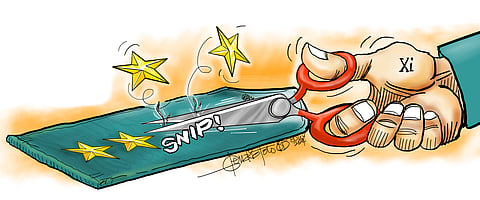
- NEWS
- the EDIT
- COMMENTARY
- BUSINESS
- LIFE
- SHOW
- ACTION
- GLOBAL GOALS
- SNAPS
- DYARYO TIRADA
- MORE

In a recent CNN report, the removal of two defense ministers in China under President Xi Jinping’s leadership underscores a pivotal moment in the country’s military strategy and internal political dynamics.
This move signals Xi’s commitment to bolstering China’s defense apparatus amid growing regional tensions and global scrutiny. By analyzing the context, implications, and potential consequences of these leadership changes, we can gain deeper insights into China’s evolving military ambitions under Xi’s stewardship.
The ousting of two defense ministers suggests a deliberate shift in China’s military leadership strategy. This action is not merely administrative but carries profound political and strategic implications.
Historically, changes in high-ranking military positions in China are carefully orchestrated to align with the ruling party’s overarching goals and policies. Xi Jinping, since assuming power, has emphasized the modernization and strengthening of the People’s Liberation Army (PLA) as a central pillar of his vision for a rejuvenated China on the global stage.
Xi’s tenure has been marked by an assertive foreign policy and increased military spending, reflecting a desire to project China’s power and protect its interests more assertively.
The removal of defense ministers could be interpreted as Xi’s effort to consolidate control over military strategy and ensure that leadership within the PLA remains aligned with his agenda. This move aims to streamline decision-making processes and enhance operational effectiveness, crucial in an era defined by geopolitical rivalries and technological advancements.
Moreover, these leadership changes occur against a backdrop of heightened regional tensions, particularly in the South China Sea and Taiwan Strait.
China’s assertiveness in territorial disputes and its expansive military activities have drawn international concern and scrutiny.
For Xi Jinping, a robust and loyal military leadership is indispensable in navigating these complex geopolitical challenges while maintaining domestic stability and advancing China’s strategic interests.
The timing of these dismissals also holds significance in the context of domestic politics within the Chinese Communist Party (CCP). Xi Jinping has consolidated power to an unprecedented degree since assuming leadership, emphasizing centralized control and ideological conformity.
By reshuffling key military figures, Xi not only reaffirms his authority but also sends a message of discipline and loyalty expected from party cadres and military officials alike. This internal cohesion is essential for Xi’s broader agenda of achieving the “Chinese Dream” of national rejuvenation and global prominence.
As advancements in artificial intelligence, cyber warfare, and space exploration redefine modern warfare, Xi Jinping aims to position China at the forefront of technological innovation in military affairs. The PLA’s transformation into a more agile, high-tech force capable of both conventional and asymmetric warfare is a cornerstone of Xi’s strategy to secure China’s status as a major global power.
Critics and analysts believe the removal of the defense ministers could potentially signal a shift towards a more aggressive or defensive military doctrine, depending on how Xi Jinping interprets China’s strategic imperatives in the coming years.
The international community, particularly neighboring countries and Western powers, will closely monitor these developments for any indications of heightened military assertiveness or escalatory behavior.
Xi’s leadership style, characterized by a mix of authoritarian control and strategic pragmatism, has reshaped China’s political landscape in ways that have far-reaching implications domestically and internationally.
The removal of high-ranking military officials serves as a reminder of Xi’s commitment to enforcing discipline and loyalty within the ranks of the CCP and the PLA.
The implications of these leadership changes extend beyond military affairs, shaping China’s broader geopolitical strategy and international relations.
As China continues to assert its influence on the global stage, the world watches closely how Xi Jinping navigates these complexities to achieve his vision of a revitalized Chinese nation in the 21st century.
